| Srl | Item |
| 1 |
ID:
121060
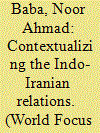

|
|
|
|
|
| Publication |
2013.
|
| Summary/Abstract |
The Islamic revolution in Iran during 1978-79 resulted in bringing about a fundamental change in the Iranian foreign policy orientation that had a positive bearing on the indo-Iranian relationship. To reinforce this relationship the two countries began to discover and emphasize a number of commonalities between the two in history and in contemporary times. In this context while as Pakistan continued to be pro-west and the US partner in anti-Soviet war in Afghanistan, Iran gained greater proximity with India as a member of non- aligned community. In the changed context Iran became weary of the OIC and its activities. This indifference towards OIC and many of its conservatively oriented concerns was reinforced by Iraq-Iran war that polarized the Muslim countries.
|
|
|
|
|
|
|
|
|
|
|
|
|
|
|
|
| 2 |
ID:
183246


|
|
|
|
|
| Summary/Abstract |
The weight of ideational factors has always been felt in Iran’s foreign policy processes as it, often times, outweighs that of material factors in its strategic calculus. Since 1979, the revolutionary state identity has focused on keeping the country independent and shaped its foreign policy continuum of enmity and amity accordingly. As the centrepiece of Iran’s foreign policy enactment and framing, independence brought ideational factors into Iran’s foreign policy processes. A close look into the past four decades suggests that strategic proportionality – based on the three principles of dignity, wisdom and expediency – vis-à-vis rivals and foes directed much of Iran’s foreign policy conduct, connecting ideational and material factors.
|
|
|
|
|
|
|
|
|
|
|
|
|
|
|
|
| 3 |
ID:
146346
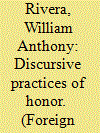

|
|
|
|
|
| Summary/Abstract |
This paper examines the role of honor in the factional competition that shapes Iran’s nuclear program foreign policy preference formation. The literature on Iranian foreign policy recognizes the nature of that process as highly factionalized. I contend that honor plays a significant role in Iran’s factional competition and foreign policy preferences because standing within the Iranian system and Iran’s standing in the international system are intertwined phenomena. Since Iran’s standing in the international system, as a nation-state, reflects back on the political elite as a whole, honor is both an important element in how the Iranian political elite compete for power and how Iran views its relationship with the United States. The role of honor in the factional competition is intensified by Iran’s nuclear program that is wrapped in nationalistic, anti-imperialistic, and revolutionary honor terms. Therefore, any member of Iran’s political elite that can be cast as surrendering Iran’s “right” to enrichment, for example, is called a traitor and is publicly shamed. I bring this to light by examining the discursive practices of honoring and shaming intrinsic to the factional competition for control of Iran’s nuclear foreign policy decision-making.
|
|
|
|
|
|
|
|
|
|
|
|
|
|
|
|
| 4 |
ID:
117532
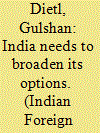

|
|
|
| 5 |
ID:
177801


|
|
|
|
|
| Summary/Abstract |
Addressing the scarcity of scholarly literature on Iran’s involvement in Sub-Saharan Africa during the Pahlavi period, this paper demonstrates that throughout the 1970s, as the shah’s international standing rose and Iran’s economy grew, so too did Iran’s political and economic relationships with several African countries, especially Senegal. The article will explore a number of factors that stimulated this relationship, most significantly Senegal’s strategic and symbolic importance, and the personal friendships that developed between the countries’ leaders. The ultimate manifestation of this bilateral relationship was the Keur Farah Pahlavi project; a joint Iranian–Senegalese city to be constructed in Senegal. By exploring this project, the paper aims to demonstrate the strategies through which the Pahlavi state sought to expand its influence worldwide.
|
|
|
|
|
|
|
|
|
|
|
|
|
|
|
|
| 6 |
ID:
130715
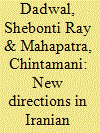

|
|
|
|
|
| Publication |
2014.
|
| Summary/Abstract |
After the June 2013 election when Hassan Rouhani became president of Iran, Iranian foreign policy changed course. The fundamental transformation is the result of his decision to open up a fresh dialogue with the United States and other Great Powers to resolve the nuclear stand-off that would end the country's isolation, lift the biting US-led sanctions and allow Iran to open a new chapter in its economic policy and international diplomacy.
|
|
|
|
|
|
|
|
|
|
|
|
|
|
|
|
| 7 |
ID:
154090
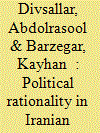

|
|
|
|
|
| Summary/Abstract |
Iran's foreign policy has been shifting to meet its regional and global environment, as well as domestic dynamics. In the past, ideology played a significant role as a driver of foreign policy. For instance, the idea that Iran had a global responsibility toward Muslims, and that faith would bring victory, was based on Islam as its main resource.
|
|
|
|
|
|
|
|
|
|
|
|
|
|
|
|
| 8 |
ID:
171323
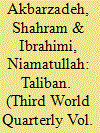

|
|
|
|
|
| Summary/Abstract |
Iran has pursued a highly contradictory policy towards Afghanistan. On the one hand, it became a significant beneficiary of the overthrow of the Taliban regime by the US-led military intervention in 2001 in Afghanistan. The new Afghan government established cordial ties with Iran, allowing it to expand its political, economic and cultural influence in the country. Yet Iran has also provided significant support to the Taliban in its campaign to violently upend the political, social and economic processes in the country. This article examines the underlying domestic and regional security dynamics that contribute to this contradictory behaviour. It offers an assessment of how tensions between the United States and the Islamic Republic, as well as Tehran’s growing threat perception following the rise of the Islamic State – Khorasan in 2014, impact on Iran’s policy towards the Taliban. The paper argues that Tehran views the Taliban as an instrument to disrupt the influence of other actors in Afghanistan. The instrumentalisation of the Taliban, however, is likely to be counterproductive for Iranian security in the long run as it contributes to Afghanistan’s instability and insecurity and undermines Iran’s own long-term interests.
|
|
|
|
|
|
|
|
|
|
|
|
|
|
|
|
| 9 |
ID:
109812
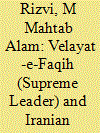

|
|
|
|
|
| Publication |
2012.
|
| Summary/Abstract |
There has been an increasing assertion of the velayat-e-faqih in Iranian politics in recent years. This has led to tensions between them and the presidential office in Iran. Against this backdrop, this article seeks to analyse the constitutional position of the velayat-e-faqih and how it has interacted with other institutions to shape Iranian foreign policy. The article critically analyses the relationship between the velayat-e-faqih and different popularly elected presidents. It concludes that this institution has been able to determine the course of Iranian foreign policy so far and will play an important role in its formulation in the future.
|
|
|
|
|
|
|
|
|
|
|
|
|
|
|
|